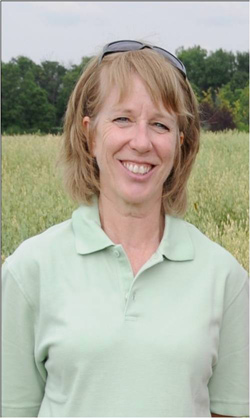The crafting of organic oats
Did you have oatmeal for breakfast this morning? Perhaps you ate an oat variety crafted by Jennifer Mitchell Fetch.
Organic Agriculture Centre of Canada
 Jennifer Mitchell Fetch knows a thing or two about breeding oats. The mixing of the pollen from the anther of a given plant with the ovary, hidden in the pistil, of another plant is part of her regular work. An Agriculture and Agri-Food Canada researcher since 1998, she has been involved in the creation of eight oat varieties commercialized in Canada. Her success hinges on mixing and matching the strengths of various oat lines, forming varieties that are successful under Canadian conditions.
Jennifer Mitchell Fetch knows a thing or two about breeding oats. The mixing of the pollen from the anther of a given plant with the ovary, hidden in the pistil, of another plant is part of her regular work. An Agriculture and Agri-Food Canada researcher since 1998, she has been involved in the creation of eight oat varieties commercialized in Canada. Her success hinges on mixing and matching the strengths of various oat lines, forming varieties that are successful under Canadian conditions.
Mitchell Fetch discovered her passion for agronomy and feeding the world as a young adult, thanks in large part to a summer job at the research station in Swift Current, Saskatchewan, where she was raised. She went on to study plant breeding at North Dakota State University, completing her PhD in 1989. Her thesis explored the combination of high producing oil flax with high yielding straw flax, resulting in a hybrid integrating the best features of both lines.
Mitchell Fetch explains the breeding process: "You take pollen from the anthers of the donor plant and you dust it on the stigma of the receiving plant and you hope to get a seed. Then you grow those seeds out in the field and look at them to see if they are segregating for traits you want to combine... We try to select the plants that show the traits we can observe in the field and harvest the seed from those plants. When we have more seeds, we can test the lines under more environments. The line that performs the best in any environment, or in several different environments, is the one that we will continue to develop, hopefully to create a variety."
The production of oats, a cooler season crop, in Canada remains important. Think of their myriad uses: breakfast porridge, granola and energy bars, cookies and meatballs, not to mention feed for horses and other livestock. As oat production in the US declines, largely the result of the Farm Bill's encouragement of the production of corn and soybeans, the US market for Canadian oats is strong.
A few years ago, organic producers expressed concern that most, if not all, cultivars registered for commercial production in Canada had been developed under conventional management, believing that there may be benefits to the development and selection of lines under organic management. Mitchell Fetch is now attempting to address this concern. Beginning in 2003, oat breeding experiments began on land at the University of Manitoba, slowly increasing in size over the years. Today, organic oat nurseries and yield trials are underway as part of the long-term rotation project in Glenlea.
Some lines do seem to perform better under organic conditions, but difficulties arise when comparing production traits on organic and conventional sites. Geographic separation and local environmental conditions must be accounted for. Without a side by side comparison, it is hard to get clear results, yet it remains difficult to find neighboring organic and conventional sites.
"We haven't answered the question yet; there are indications that the lines that perform well in many different environments might do better under organic conditions," states Mitchell Fetch, adding that one promising variety still under trial may be evaluated for registration in 2013.
Jennifer has a curious mind, enjoying the search for answers to questions about what she observes or those posed by others. The current trend of cooperating closely with industry offers the chance to have the results of her work commercialized and is good for the entire value chain. But, as breeding takes at least ten years, she hopes that middle and long term projects will continue to be supported.
Besides crafting cultivars, Jennifer enjoys crafting arts such as crocheting, scrapbooking and creating jewelery and being involved with her church community. But, her career remains a very important part of her life. She is the wife of Tom Fetch, another AAFC scientist and stem rust pathologist. When she retires, she would like to be able to see the cultivars she was involved in developing being grown widely, used in many of food products and that consumers' health was improved.
Mitchell Fetch is excited about organic becoming an important part of the Canadian production system. The stewardship of the land environment are matters that she supports. And, if anyone wants to discuss oats, Mitchell Fetch is more than willing to talk!
This article was written by Nicole Boudreau, Organic Federation of Canada, on behalf of the OACC with funding provided by Canada’s Organic Science Cluster (a part of the Canadian Agri-Science Clusters Initiative of Agriculture and Agri-Food Canada's Growing Forward Policy Framework). The Organic Science Cluster is a collaborative effort led jointly by the OACC, the Organic Federation of Canada and industry partners. For more information: oacc@dal.ca or 902-893-7256.
Posted August 2012
